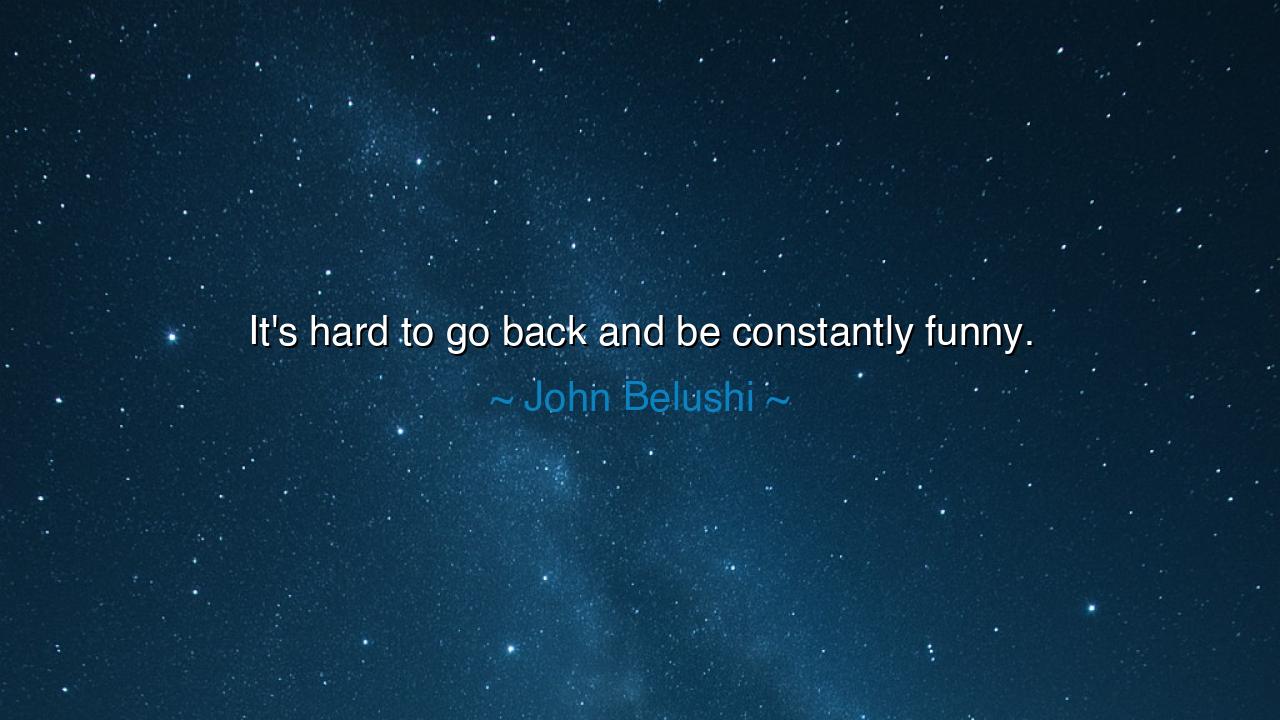
It's hard to go back and be constantly funny.






“It’s hard to go back and be constantly funny.” — thus spoke John Belushi, a comet of laughter whose brilliance lit the sky of comedy for too brief a time. In this simple yet profound statement, there lies not only humor, but sorrow; not only wit, but wisdom born from struggle. For Belushi, who rose from the stages of improvisation to the immortality of film and television, knew the price of laughter — how heavy the mask of the fool could grow when worn too long. His words speak to the weariness of those who bring joy to others, the invisible burden carried by those expected to make the world smile.
To the ancients, the comedian was a kind of priest — one who turned pain into mirth, who transmuted the ordinary into delight. Laughter, they believed, was sacred; it healed, it united, it gave release to the weary heart. Yet those same ancients also knew that joy, when demanded endlessly, can become a form of slavery. The Greek actors who performed in masks of tragedy and comedy often spoke of the strange exhaustion that followed the laughter of the crowd — for behind the painted smile was a soul that still knew sorrow. Belushi, centuries later, gave voice to that same truth: that to “be constantly funny” is not only difficult, but unnatural to the human heart.
In his short but meteoric life, John Belushi became a symbol of raw energy and fearless comedy. From Saturday Night Live to Animal House, his performances were a force of nature — unpredictable, hilarious, and filled with a kind of wild innocence. Yet behind the laughter, Belushi wrestled with fatigue, expectation, and the pressure to forever be the jester the world adored. The quote — “It’s hard to go back and be constantly funny” — reveals a man aware of this tension. Each performance demanded more energy, more brilliance, more laughter. The joy he gave to millions became a weight he could scarcely carry himself.
There is a lesson in his words that transcends the stage. It speaks to all who live under the gaze of expectation — those who must always be strong, cheerful, capable, or perfect. To be “constantly funny” is but one form of this endless demand. The teacher who must always be wise, the parent who must always be patient, the leader who must always be sure — all know the weariness Belushi described. For no soul can sustain a single mask forever. Even the sun must set to rise again. To go back, to repeat, to always be what others demand — this is to live without rest for the spirit.
In truth, Belushi’s words carry not cynicism, but yearning — the longing for authenticity. The human heart is many things: joyful, sorrowful, tired, inspired. True art, true living, requires space for all these shades. Even laughter loses its music when forced; even the clown deserves silence sometimes. When Belushi said it was hard to be “constantly funny,” he was reminding us that humor must be alive, not manufactured — that it springs from spontaneity, honesty, and the unpredictable spark of the soul. The same is true of all our gifts: they wither when demanded without rest or renewal.
The story of Belushi’s life serves as both inspiration and warning. His laughter brought light to a generation, yet his spirit burned too quickly, consumed by the pressures of fame and expectation. The world mourned him not only for the man he was, but for the unspoken pain behind the laughter. His words echo now as a timeless truth: that even those who make us laugh most need understanding, rest, and space to be human. For the giver of joy, too, must be allowed to grieve, to reflect, to simply be.
Let this be the lesson: do not demand constancy from the soul — neither in humor, nor in strength, nor in success. Allow yourself, and those you love, the grace to change, to rest, to fall silent. Appreciate the moments of laughter as gifts, not as obligations. And when your own light grows dim, do not despair — even the stars must retreat behind the clouds before they shine again.
Thus through the laughter and the pain of John Belushi, we glimpse a greater wisdom: that humor, like life, must breathe. It is not endless performance, but sacred rhythm — a dance between joy and sorrow, presence and pause. To be “constantly funny” may please the crowd, but to be authentically human — that is the truest act of courage, and the deepest kind of art.






AAdministratorAdministrator
Welcome, honored guests. Please leave a comment, we will respond soon